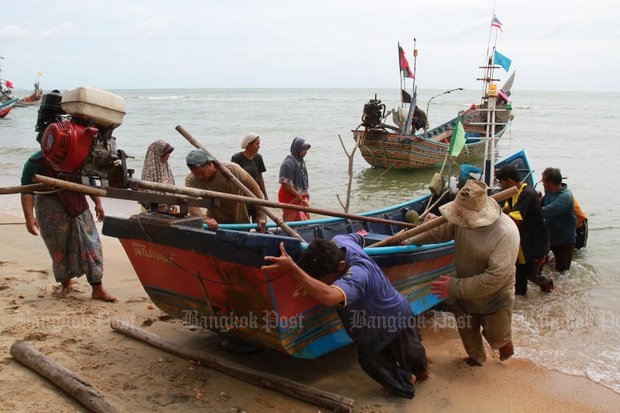
Local fishermen have called on the government to revoke Section 34 of the new fishing law, saying it will damage coastal environments and force local fishermen to struggle in the face of larger fishing operations.
Groups of fishermen nationwide have sent complaint letters to the government via the governors in their home provinces after the government revoked Section 34 of the Fishery Act 2015, issued to tackle Illegal, Unreported and Unregulated (IUU) fishing.
According to the law, these fishermen are limited to "inshore fisheries" within three nautical miles (5.5km) of the coastline, meaning they are prohibited from fishing offshore.
Violators face fines of between 50,000 baht and 500,000 baht, amounts five times higher than the value of their daily harvest.
Fishermen have proposed dividing fishing zones based on fishing gear, such as destructive and non-destructive gear, rather than by types of vessels such as near-shore boats and fishing trawlers.
"It's unfair the law confines us to work within a boundary but the commercial fishing vessels can go beyond the three nautical mile zone," said fisherman Lamom Boonyong, 64, who protested in Rayong.
The new fishing law is part of an effort by the government to address the European Union's yellow card for failing to curb problems associated with IUU fishing.
It also includes some upgraded measures to solve over-fishing, create better registration systems and regulate fishing in foreign waters.
The law was initially issued as an emergency decree so there were no public hearings during its drafting process.
From the fishermen's point of view, the law does not consider local context and local fishery cultures that use low-impact fishing gear.
In Rayong, about 3,000 inshore fishermen said there are no fish in the three nautical mile zone, which they attribute to pollution resulting from rapid industrial development.
In the South, fishermen operate as far out as 12 nautical miles from the coastline as the three-mile areas are conservation zones where all fishing is prohibited.

Fishermen prepare their boats before setting out to sea in Bang Ta Boon bay of Phetchaburi's Ban Laem district. A group of artisanal fishermen gathered to protest an executive decree on fishing which bans artisanal fishermen from fishing beyond three nautical miles offshore. (Photo by Chanat Katanyu)
Krabi fishermen battled illegal fishery operators for decades, eventually persuading authorities to issue ministerial regulations to establish restricted zones for trawlers and push-nets in Phangnga bay in 1998.
"The new law will force local fishermen to catch in this preservation zone until they run out of fish and conflicts result among them. Our fight over decades to conserve the ocean will have gone to waste. This is like going backwards," said Torhad Klongyuan, a fisherman from Krabi.
Jumpol Lumpiganon, spokesman for the government's Command Centre for Combating Illegal Fishing, said ministerial regulations and new fishing licences will have to be issued before the new fishing comes into effect, which should ease fishermen's concerns.
A newly set-up provincial committee for fisheries created under the act will issue the licences.
The committee -- comprising local stakeholders including fishermen -- will work to determine the proper fishery zone, which can be extended to 12 nautical miles, and the appropriate number of fishing licences based on local context and resource potential.
This can result in the issuing of new ministerial regulations that fit local contexts. The Ministry of Agriculture and Cooperatives is working to arrange a meeting to discuss these issues, including proper fishing tools for each location.
A source from the Department of Fisheries said local fishermen could venture out a little further than the agreed upon distance which will be finalised by the provincial fishing committee. The specific zone will prevent confrontations between local fishermen and commercial trawlers.
Meanwhile, the government insists it has made progress in its efforts to tackle IUU fishing by improving legislation and issuing manuals covering legal fishing practices.
Government spokesman Sansern Kaewkamnerd said Monday that the government was ready for the EU inspection of the government's progress, set for Tuesday through Thursday.
Progress included amendments to the fishing law, a vessel monitoring system on vessels with a gross tonnage of 60 tonnes, a traceability system to be launched on March 30, tougher fishing vessel inspections and tracking, and prohibiting workers under 18 years of age from working in seafood processing factories.
Thailand will also seek to cooperate with neighbouring countries for the recruitment of foreign workers for the domestic fishing industry.
